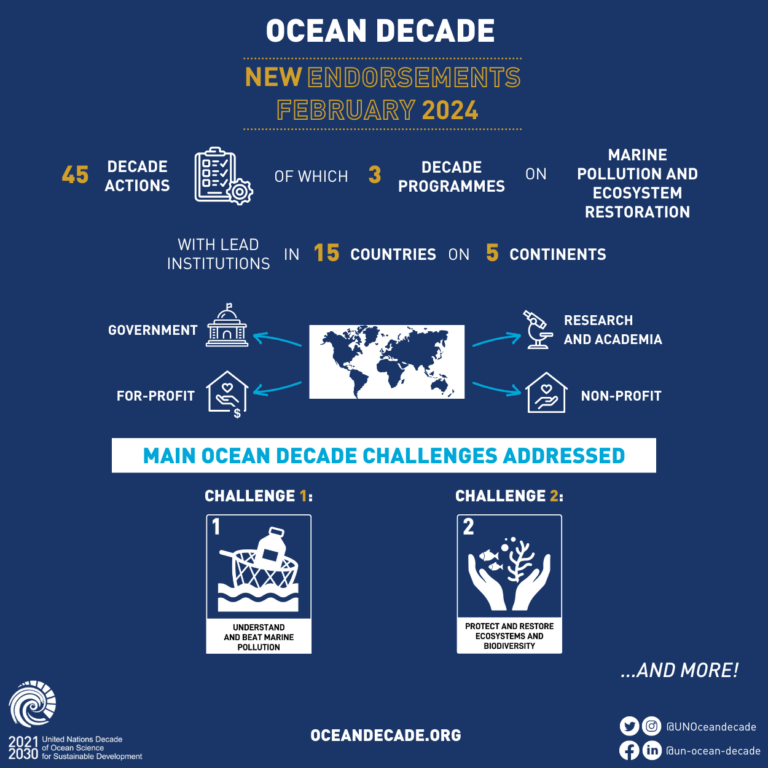시행 4년차를 맞이하는 유엔 지속 가능한 개발을 위한 해양과학 10년('해양 10년')은 건강한 해양을 위한 과학 기반 솔루션의 발전에 초점을 맞춘 45개의 새로운 10년 행동 계획을 승인했습니다.
해양 10년은 1년에 두 번, 10년 행동 촉구를 통해 해양 10년의 10대 도전과제에 기여하는 영향력 있는 이니셔티브에 다양한 해양 주체들을 결집하고자 합니다. '우리가 원하는 바다를 위해 필요한 과학'이라는 비전에 따라 이번 10년 행동은 생태계 스트레스 요인 및 오염원, 생물 다양성 복원, 친환경 기술, 기후 완화, 해양 모니터링, 역량 개발, 해양 리터러시 등 시급한 해양 문제를 다룹니다.
Extending across 15 countries – from Australia to the United Kingdom, Fiji and Senegal – the new Actions are primarily led by governmental and research institutions, along with non-governmental and educational organizations.
"오늘날 우리는 잘 기능하는 바다를 달성하기 위한 주요 구성 요소를 갖추고 있으며, 전 세계 행동의 탄탄한 토대 위에 정량화 가능한 이정표가 포함된 명확하고 공통된 비전 2030을 개발하고 있습니다."라고 해양 10년을 조정하는 유엔 기구인 유네스코 정부간해양학위원회(IOC)의 블라디미르 랴비닌 사무차장이 말했습니다. "45개의 새로운 행동이 추가되면서 국가별 현실, 역량, 개발 수준은 다양하지만 우리의 네트워크는 매년 계속 확장되고 있으며 더욱 심오하고 지속적인 영향을 미치고 있다는 사실을 확인하게 되어 기쁘게 생각합니다."
과학 중심 솔루션을 촉진하는 공동 해양 이니셔티브
3개의 새로운 해양 10년 프로그램은 플라스틱 및 영양염 오염에 초점을 맞춘 도전과제 1 - 해양 오염과 지역 기반 관리, 복원 및 여러 해양 스트레스 요인에 우선순위를 둔 도전과제 2 - 생태계 복원 및 관리를 다룹니다.
영국 환경, 수산 및 양식 과학 센터의 영양염 오염 - 글로벌 행동 네트워크(NP-GAN) 는 영양염 및 폐수 오염이 해양 생태계와 인간 건강에 미치는 영향을 다루고 있습니다. 기존의 접근 방식을 뛰어넘어 모니터링, 평가 및 완화 활동을 위한 실용적인 방법과 지침으로 구성된 혁신적인 툴박스를 개발할 예정입니다.
호주 시드니 해양과학연구소에서 시행하는 세계 항만 바다 경관 복원 프로그램(WHSR) 은 여러 생태계 복원 이니셔티브를 통합하여 전 세계 도시화된 지역의 전체 바다 경관을 복원하기 위한 템플릿을 만듭니다.
IOC/유네스코와 유엔식량농업기구(FAO)가 공동으로 주도하는 유해 조류 확산 솔루션(HAB-S) 프로그램은 유해 조류의 영향을 받은 해양 및 해안 자원의 지속 가능한 관리와 이용을 위한 과학 기반 솔루션을 제공하는 것을 목표로 합니다.
브라질 과학기술혁신부와 공동 후원하는 11개 프로젝트는 브라질 열대 해안 지역과 전 세계에서 맹그로브 보호 및 복원, 해안 모니터링, 오염 및 해양 문맹 퇴치를 위한 혁신적인 솔루션을 통해 연안의 복원력을 높이기 위해 노력합니다.
새로 승인된 프로젝트 중 6개는 IOC/유네스코가 주도하는 해양 10년 프로그램에서 주최합니다. 이 프로젝트는 순환 해양 경제, 해양 모니터링, 역량 개발 및 역량 강화, 인식 제고 도구, 홍보 활동 등 다양한 주제를 포괄합니다.
해양 과학의 협업 설계를 지원하기 위해 글로벌 네트워크를 확장하는 Ocean Decade
해양 10년의 이행을 지원하기 위해 6개의 새로운 10년 기부금이 공식 승인을 받았습니다. 이러한 이니셔티브는 지속 가능한 관리와 해양 생태계 및 생물 다양성 보호에 중점을 두고 필요한 자금 또는 현물 자원을 제공하며 전략적 커뮤니케이션 및 홍보 활동을 펼칠 것입니다.
이 중 CORDAP이 주도하는 산호 연구 개발 가속기 플랫폼은 온수 및 냉수 산호 보존을 목표로 하는 조정되고 협력적인 글로벌 R&D 프로그램에 자금을 지원하고, 실행 및 관리함으로써 해양 10년을 지원할 것입니다.
이번 기여금에는 10년 조정 부서의 업무를 강화하기 위한 두 개의 새로운 10년 이행 파트너(DIP)도 포함되어 있습니다. IOC/유네스코의 글로벌 해양 관측 시스템의 유럽 구성요소인 EuroGOOS는 유럽 해양에서 지속적인 관측을 보장하기 위해 우선순위를 파악하고 협력을 강화하며 해양학 운영의 이점을 홍보할 것입니다.
중국에 본사를 둔 남방과학기술대학교(SUSTech)와 선전해양대학교(SOU) 는 협업과 교육 프로그램을 통해 글로벌 해양 리터러시 개발에 힘쓰고 있습니다.
최근의 지지 물결로 해양 10년 행동의 총 포트폴리오는 모든 대륙과 모든 해양 유역을 아우르는 476개로 늘어났습니다.
여기에서 승인된 해양 10년 행동의 전체 목록을 확인하십시오.
자세한 내용은 다음 연락처로 문의하십시오.
오션 디케이드 커뮤니케이션 팀 (oceandecade.comms@unesco.org)
***
바다 10년 소개:
2017년 유엔 총회에서 선포된 ' 지속 가능한 발전을 위한 유엔 해양과학 10년(2021-2030)'('해양 10년')은 해양 과학과 지식 창출을 촉진하여 해양 시스템의 쇠퇴를 되돌리고 이 거대한 해양 생태계의 지속 가능한 발전을 위한 새로운 기회를 촉진하는 것을 목표로 합니다. 해양 10년의 비전은 '우리가 원하는 바다를 위해 필요한 과학'입니다. 해양 10년은 다양한 분야의 과학자와 이해관계자들이 해양 과학의 발전을 가속화하고 활용하는 데 필요한 과학적 지식과 파트너십을 개발하여 해양 시스템에 대한 이해를 높이고 2030 의제를 달성하기 위한 과학 기반 솔루션을 제공할 수 있는 소집 프레임워크를 제공합니다. 유엔 총회는 유네스코 정부간해양학위원회(IOC)에 10년의 준비와 이행을 조율하도록 위임했습니다.
IOC/유네스코 소개:
유네스코 정부간해양학위원회(IOC/UNESCO)는 해양, 해안 및 해양 자원의 관리를 개선하기 위해 해양 과학 분야의 국제 협력을 촉진합니다. IOC는 150개 회원국이 역량 개발, 해양 관측 및 서비스, 해양 과학 및 쓰나미 경보 분야의 프로그램을 조정하여 협력할 수 있도록 지원합니다. IOC의 활동은 평화와 지속 가능한 발전의 토대인 경제 및 사회 발전의 핵심인 지식과 역량을 개발하기 위해 과학의 발전과 그 응용을 촉진하는 유네스코의 사명에 기여합니다.
